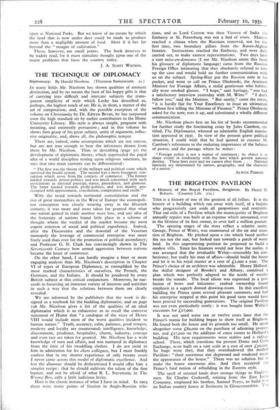THE TECHNIQUE OF DIPLOMACY
Diplomacy. By Harold Nicolson. (Thornton Butterworth. 5s.)
IN many fields Mr. Nicolson has shown qualities of eminent distinction, and by no means the least of his happy gifts is that of carrying into difficult and intricate subjects the trans- parent simplicity of style which Lecky has described as, perhaps, the highest reach of art. He is, in short, a master of the art of composition; and, with the possible exception of the volume on Christianity by Dr. Edwyn Bevan, he has surpassed
even the high standard set by earlier contributors to the Home University Library. His style is always simple, pregnant with meaning, and eminently persuasive ; and in this volume he shows firm grasp of his great subject, unity of argument, reflec- tive originality, and, above all, the philosophic temper.
There are, indeed, some assumptions which are not untrue, but are not true enough to bear the inferences drawn from them by Mr. Nicolson. Thus in describing (page 51) the development of diplomatic theory, which superseded the papal idea of a world discipline resting upon religious sanctions, he says that two main currents can be differentiated : "The first was the theory of the military and political caste which survived the feudal system. The second was a more bourgeois con- ception which arose from the contacts of commerce. The former tended towards power-politics and was much concerned with such associations as national prestige, status, precedence, and glamour. The latter tended towards profit-politics, and was mainly pre- occupied with appeasement, conciliation, compromise and credit."
With the trend towards territorial consolidation and the rise of great monarchies in the West of Europe the cosmopoli- tan conception was clearly wearing away in the fifteenth century; it was more and more taken for granted that what one nation gained in trade another must lose, and any idea of the fraternity of nations found little place in a scheme of thought where the verdict of the market became the most cogent criterion of social and political expediency. Indeed, after the Discoveries and the downfall of the Venetian monopoly the leverage of commercial enterprise was more freely used than ever for the promotion of political ascendancy;
and Professor G. N. Clark has convincingly shown in The Seventeenth Century how armed aggression between nations
became the heart of commerce.
On the other hand, I can hardly imagine a finer or more engaging analysis than Mr. Nicolson's description in Chapter VI of types of European Diplomacy, as exemplified by the most marked characteristics of ourselves, the French, the Germans, and the Italians. It should be pondered by every British subject at this critical conjuncture. Moreover, he suc- ceeds in focussing an immense variety of interests and activities in such a way that the relations between them are clearly revealed.
We are informed by the publishers that the work is de- signed as a textbook for the budding diplomatist; and on page 126 Mr. Nicolson gives a list of the qualities of an ideal diplomatist which is so exhaustive as to recall the converse statement of Hume that "a catalogue of the vices of Henry VIII would include most of the worst qualities incident to human nature." Truth, accuracy, calm, patience, good temper, modesty and loyalty are enumerated; intelligence, knowledge, discernment, prudence, hospitality, charm, industry, courage and even tact are taken for granted. Mr. Nicolson has a wide knowledge of men and affairs, and was nurtured in diplomacy from the time of his swaddling clothes. I do not yield to
him in admiration for les chers collegues, but I must franldy confess that in my shorter experience of only twenty years I never came across this model of diplomatic excellence. And lest the alumnus should be disheartened I would offer him a simpler recipe : that he should cultivate the talent of the fine learner, and not be afraid of what R. L. Stevenson, in The Wrong Box, calls a little judicious levity.
Here is the classic instance of what I have in mind. In 1903 there were many points of friction in Anglo-Russian rela-
tions, and as Lord Curzon was then Viceroy of India the Embassy at St. Petersburg was not a bed of roses. Matters reached a climax when the Russians removed, not for the first time, two boundary pillars from the Russo-Afghan frontier. Instructions reached the Embassy, and were duly carried out, to make earnest representations. Two days later
a curt mise-en-demeure (I see Mr. Nicolson omits this from his glossary of diplomatic language) came from the Russian
Foreign Office intimating that they absolutely refused to take up the case and would hold no further communication with us on the subject. Spring-Rice put the Russian note in his pocket, and went to call on Prince Obolensld, the Assistant Minister for Foreign Affairs, a stolid gentleman who habitu- ally wore smoked glasses. "I hope," said Springy, "you had a satisfactory interview yesterday with M. Witte." "I don't follow you," said the Minister. "But surely," came the retort, "it is hardly fair for Your Excellency to issue an ultimatum
without first telling the Minister of Finance." Prince Obolenski asked for the note, tore it up, and substituted a wholly different communication.
Mr. Nicolson places first on his list of books recommended
for further study the fascinating essay by Jules Cambon, en- titled, The Diplomatist, whereof an admirable English transla- tion appeared in 1931. In view of the present grave political situation, I could wish that he had quoted -in extenso M. Cambon's references to the enduring importance of the balance
of power, and the passage where he writes : •
"Foreign policy is not a matter of sentiment ; its object is to shape events in conformity with the laws which govern national destiny. These laws exist and we cannot alter them . . . National interests are determined by nature, geography, and the character of a nation."
ALWYN PARKER.














































 Previous page
Previous page